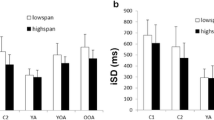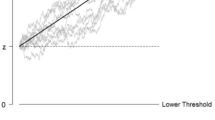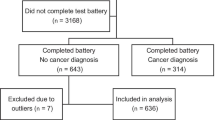Abstract
The genetic relationship between lower (information processing speed), intermediate (working memory), and higher levels (complex cognitive processes as indexed by IQ) of mental ability was studied in a classical twin design comprising 166 monozygotic and 190 dizygotic twin pairs. Processing speed was measured by a choice reaction time (RT) task (2-, 4-, and 8-choice), working memory by a visual-spatial delayed response task, and IQ by the Multidimensional Aptitude Battery. Multivariate analysis, adjusted for test-retest reliability, showed the presence of a genetic factor influencing all variables and a genetic factor influencing 4- and 8-choice RTs, working memory, and IQ. There were also genetic factors specific to 8-choice RT, working memory, and IQ. The results confirmed a strong relationship between choice RT and IQ (phenotypic correlations: −0.31 to −0.53 in females, −0.32 to −0.56 in males; genotypic correlations: −0.45 to −0.70) and a weaker but significant association between working memory and IQ (phenotypic: 0.26 in females, 0.13 in males; genotypic: 0.34). A significant part of the genetic variance (43%) in IQ was not related to either choice RT or delayed response performance, and may represent higher order cognitive processes.
Similar content being viewed by others
REFERENCES
Alarcon, M., Plomin, R., Fulker, D. W., Corley, R., and DeFries, J. C. (1998). Molarity not modularity: Multivariate genetic analysis of specific cognitive abilities in parents and their 16-yearold children in the Colorado Adoption Project. Cog. Dev. 14: 175–193.
Ando, J., Ono, Y., and Wright M. J. (2001). Genetic structure of spatial and verbal working memory. Behav. Gen. 31: 615–624.
Baddeley, A. (1992). Working Memory. Science 255: 556–559.
Baker, L. A., Vernon, P. A., and Ho, H. (1991). The genetic correlation between intelligence and speed of information processing. Behav. Gen. 21: 351–367.
Boomsma, D. I., and Somsen, R. J. M. (1991). Reaction times measured in a choice reaction time and a double task condition: A small twin study. Pers. Indiv. Differ. 12: 519–522.
Cardon, L. R., and Fulker, D. W. (1994). A model of developmental change in hierarchical phenotypes with application to specific cognitive abilities. Behav. Gen. 24: 1–16.
Cardon, L. R., Fulker, D. W., DeFries, J. C., and Plomin, R. (1992). Multivariate genetic analysis of specific cognitive abilities in the Colorado Adoption Project at age 7. Intelligence 16: 383–400.
Carroll, J. B. (1993). Human cognitive abilities: A survey of factoranalytic studies, Cambridge, Cambridge University Press.
Deary, I. J., and Stough, C. (1996). Intelligence and inspection time. Am. Psychol. 51: 599–608.
Engle, R. W., Tuholski, S. W., Laughlin, J. E., and Conway, A. R. A. (1999). Working memory, short-term memory, and general fluid intelligence: A latent-variable approach. J. Exp. Psychol. Gen. 128: 309–331.
Finkel, D., and McGue, M. (1993). The origins of individual differences in memory among the elderly: A behavior genetic analysis. Psychol. Aging 8: 527–537.
Finkel, D., Pedersen, N., and McGue, M. (1995a). Genetic influences on memory performance in adulthood: Comparison of Minnesota and Swedish twin data. Psychol. Aging 10: 437–446.
Finkel, D., Pedersen, N. L., McGue, M., and McClearn, G. E. (1995b). Heritability of cognitive abilities in adult twins: Comparison of Minnesota and Swedish data. Behav. Gen. 25: 421–431.
Fry, A. F., and Hale, S. (1996). Processing speed, working memory, and fluid intelligence. Psychol. Sci. 7: 237–241.
Fry, A. F., and Hale, S. (2000). Relationships among processing speed, working memory, and fluid intelligence in children. Biol. Psychol. 54: 1–34.
Geffen, G. M., Wright, M. J., Green, H. J., Gillespie, N. A., Smyth, D. C., Evans, D. M., and Geffen, L. B. (1997). Effects of memory load and distraction on performance and event-related slow potentials in a visuospatial working memory task. J. Cogn. Neurosci. 9: 743–757.
Goldman-Rakic, P. S. (1992). Working memory and the mind. Sci. Am. 267: 73–79.
Harrell, T. H., Honaker, M., Hetu, M., and Oberwager, J. (1987). Computerized versus traditional administration of the Multidimensional Aptitude Battery-Verbal Scale: An examination of reliability and validity. Comp. Hum. Behav. 3: 129–137.
Hick, W. E. (1952). On the rate of gain of information. Q. J. Exp. Psychol. 4: 11–26.
Ho, H., Baker, L. A., and Decker, S. N. (1988). Covariation between intelligence and speed of cognitive processing: genetic and environmental influences. Behav. Gen. 18: 247–261.
Hunt, E. (1985). The correlates of intelligence. Curr. Top. Hum. Intell. 1: 157–178.
Jackson, D. N. (1998). Multidimensional Aptitude Battery II-Manual, Port Huron, MI, Sigma Assessment Systems, Inc.
Jensen, A. R. (1980). Chronometric analysis of intelligence. J. Soc. Biol. Struct. 3: 103–122.
Jensen, A. R. (1982). Reaction time and psychometric g. In H. J. Eysenck (ed.), A model for intelligence, Berlin, Springer-Verlag, pp. 93–132.
Jensen, A. R. (1993). Why is reaction time correlated with psychometric g? Curr. Dir. Psychol. Sci. 2: 53–56.
Jensen, A. R. (1998). The g Factor. Westport, CT, Praeger.
Kail, R., and Salthouse, T. A. (1994). Processing speed as mental capacity. Acta Psychol. 86: 199–225.
King, J., and Just, M. A. (1991). Individual differences in syntactic processing: The role of working memory. J. Mem. Lang. 30: 580–602.
Kyllonen, P. C. (1993). Aptitude testing inspired by information processing: A test of the Four-sources Model. J. Gen. Psychol. 120: 375–405.
Kyllonen, P. C., and Christal, R. E. (1990). Reasoning ability is (little more than) working-memory capacity?! Intelligence 14: 389–433.
Larson, G. E., and Saccuzzo, D. P. (1989). Cognitive correlates of general intelligence: Toward a process theory of g. Intelligence 13: 5–31.
Longstreth, L. E. (1984). Jensen' reaction-time investigations of intelligence: A critique. Intelligence 8: 139–160.
Luo, D., Petrill, S. A., and Thompson, L. A. (1994). An exploration of genetic g: Hierarchical factor analysis of cognitive data from the Western Reserve Twin Project. Intelligence 18: 335–347.
MacLennan, R. N., Jackson, D. N., and Bellantino, N. (1988). Response latencies and the computerized assessment of intelligence. Pers. Indiv. Differ. 9: 811–816.
McCartney, K., Harris, M. J., and Bernieri, F. (1990). Growing up and growing apart: A developmental meta-analysis of twin studies. Psychol. Bull. 107: 226–237.
McClearn, G. E., Johansson, B., Berg, S., Pederson, N. L., Ahern, F., Petrill, S. A., and Plomin, R. (1997). Substantial genetic influence on cognitive abilities in twins 80 or more years old. Science 276: 1560–1563.
Miller, L. T., and Vernon, P. A. (1992). The general factor in shortterm memory, intelligence, and reaction time. Intelligence 16: 5–29.
Miller, L. T., and Vernon, P. A. (1996). Intelligence, reaction time, and working memory in 4-to 6-year-old children. Intelligence 22: 155–190.
Neale, M. (2000). Statistical Modeling with Mx. Department of Psychiatry, Box 126 MCV, Richmond, VA 23298.
Neale, M. C., and Cardon, L. R. (1992). Methodology for genetic studies of twins and families. Dordrecht, The Netherlands, Kluwer Academic Publishers.
Neubauer, A. C., Riemann, R., Mayer, R., and Angleitner, A. (1997). Intelligence and reaction time in the Hick, Sternberg, and Posner paradigms. Pers. Indiv. Differ. 22: 885–894.
Petrill, S. A., Luo, D., Thompson, L. A., and Detterman, D. K. (1996). The independent prediction of general intelligence by elementary cognitive tasks: Genetic and environmental influences. Behav. Gen. 26: 135–147.
Petrill, S. A., Plomin, R., Berg, S., Johansson, B., Pedersen, N. L., Ahem, F., and McClearn, G. E. (1998). The genetic and environmental relationship between general and specific cognitive abilities in twins age 80 and older. Psychol. Sci. 9: 183–189.
Rijsdijk, F. V., Vernon, P. A., and Boomsma, D. I. (1998). The genetic basis of the relation between speed-of-informationprocessing and IQ. Behav. Brain Res. 95: 77–84.
Small, M. A., Raney, J. F., and Knapp, T. J. (1987). Comparison of two reaction-time tasks and their relation to intelligence. Percept. Motor Skill 65: 867–870.
Smith, G. A., and Stanley, G. (1983). Clocking g: Relating intelligence and measures of timed performance. Intelligence 7: 353–368.
Spearman, C. (1904). ‘General Intelligence’ objectively determined and measured. Am. J. Psychol. 15: 201–293.
Thapar, A., Petrill, S. A., and Thompson, L. A. (1994). The heritability of memory in the Western Reserve twin project. Behav. Gen. 24: 155–160.
Thompson, L. A., Detterman, D. K., and Plomin, R. (1991). Associations between cognitive abilities and scholastic achievement: Genetic overlap but environmental differences. Psychol. Sci. 2: 158–165.
Vernon, P. A. (1987). New developments in reaction time research. In P. A. Vernon (ed.), Speed of information processing and intelligence, New Jersey, Ablex Publishing Corporation, pp. 1–20.
Vernon, P. A., and Kantor, L. (1986). Reaction time correlations with intelligence test scores obtained under either timed or untimed conditions. Intelligence 10: 315–330.
Welford, A. T. (1971). What is the basis of choice reaction-time. Ergonomics 14: 679–693.
Wilson, R. S. (1986). Continuity and change in cognitive ability profile. Behav. Gen. 16: 45–60.
Wright, M. J., Smith, G. A., Geffen, G. M., Geffen, L. B., and Martin, N. G. (2000). Genetic influence on the variance in coincidence timing and its covariance with IQ: A twin study. Intelligence 28: 239–250.
Wright, M. J., Boomsma, D., de Geus, E., Posthuma, D., van Baal, C., Luciano, M., Hansell, N. K., Ando, J., Hasegawa, T., Hiraishi, K., Ono, Y., Miyake, A., Smith, G. A., Geffen, G. A., Geffen, L. B., and Martin, N. G. (2001). Genetics of cognition: Outline of collaborative twin study. Twin Res. 4: 48–56.
Author information
Authors and Affiliations
Rights and permissions
About this article
Cite this article
Luciano, M., Wright, M.J., Smith, G.A. et al. Genetic Covariance Among Measures of Information Processing Speed, Working Memory, and IQ. Behav Genet 31, 581–592 (2001). https://doi.org/10.1023/A:1013397428612
Issue Date:
DOI: https://doi.org/10.1023/A:1013397428612




